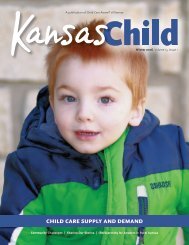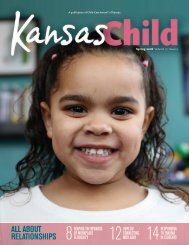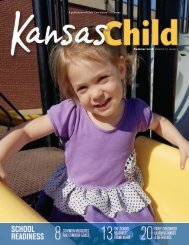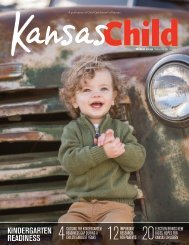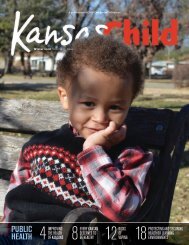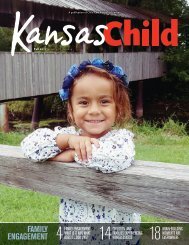2021Winter KansasChild_Final (3)
Create successful ePaper yourself
Turn your PDF publications into a flip-book with our unique Google optimized e-Paper software.
Connection
Play
Why Early Childhood Education
Should Be a Part of Every Child’s Story
BY TABATHA RESPROY
Whether you are a child or an adult, we all are in desperate need
of connection, which this pandemic has proven to us all over again.
From the moment we are born, we are seeking it. These positive
connections with others build patterns in our brain that we rely on
later in life to help us solve problems and interact with our peers.
That’s why reaching a child from birth to age 5 is so crucial: It’s
when their brains are developing most rapidly and when they are
becoming hard-wired with behaviors that can help or harm their
future selves.
I’ve seen early childhood education move children from special
education to general education in less than a year. I’ve seen it change
troubled, aggressive kids with lives full of trauma into ones with the
skills to calm and self-regulate in kindergarten. I’ve seen it positively
affect the lives of so many children, and I’ve also seen the negative
effects of not reaching children until it’s much more difficult to reshape
destructive patterns in their lives.
We learn through experience. We learn through conflict.
The great Dr. Becky Bailey says, “Conflict is our friend.”
I repeat that to myself every time I begin to feel that
old nudge of impatience when I have an expectation
for my classroom that is thwarted by a disagreement
amongst littles. But this is how they learn. And I can
offer an environment where children are challenged
to grow through their own experiences. What better
way to do that than through play?
The most valuable learning takes place in open-ended
activities that are heavily based in play and exploration.
THIS is how children learn best. They learn by having
things in their hands, trying out different ideas, and experiencing
conflict. This is not only how our littlest students learn best, it’s how
most children learn best.
Fred Rogers said it best when he said, “Play is often talked about
as if it were a relief from serious learning. But for children, play is
serious learning.”
When I think about the incredible opportunities for play and
connection that early childhood programs provide, I also have to
think about the children we aren’t reaching. Across the country, only
34% of all 4-year-olds are enrolled in state-funded pre-K programs.
That’s 1.5 million students. So, we have 3.5 million students who
are potentially underserved. Some states move ahead while others
leave students without access. The number of 3-year-olds enrolled
in state-funded programs is even smaller, and the number of infants
and toddlers is even smaller than that.
One piece of my students’ stories might be their trauma. But another
piece of their story is my classroom. Both experiences have
the power to change their lives forever, but their time in my classroom
makes the next chapters of their lives ones of strength and
hope. That’s why I dream of working to make a quality early childhood
education experience a part of every child’s story.
TABITHA RESPROY
Early Childhood
Educator & 2020 National Teacher of the Year
Tabatha Rosproy, a veteran early childhood educator from
Winfield, Kan., is the 2020 National Teacher of the Year. The
first early childhood educator to be named National Teacher of the
Year, Tabatha hopes to use her platform to promote universal preschool
and expanded social-emotional learning for all students.
www.ks.childcareaware.org
11











